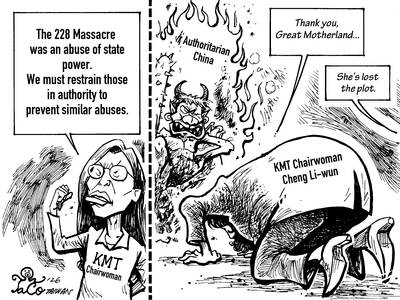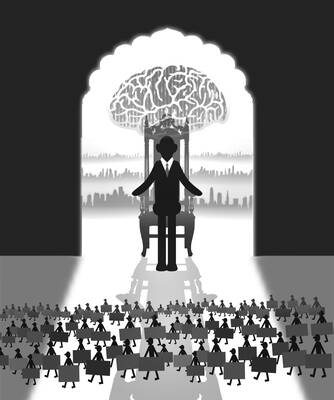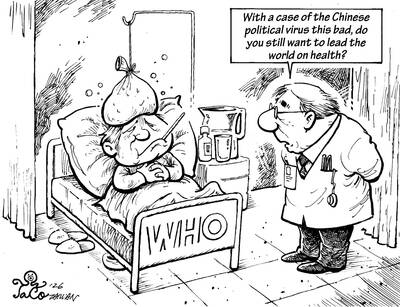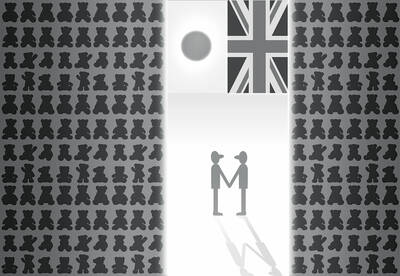Lithuania, led by Prime Minister Inga Ruginiene, is considering a definitive shift in its strategy toward China. Such a change would require a significant scaling back of its relations with Taiwan.It was the Lithuanian prime minister herself who introduced this possibility. Ruginiene took office in
When the flames of war leapt from the Caribbean coast of Caracas to the Alborz Mountains overlooking Tehran, the geopolitical map began its most brutal reshuffling since the end of the Cold War.As US-Israeli forces launched a series of precision, regime-targeted strikes against Iran — openly declari
Following the US Supreme Court’s ruling that US President Donald Trump’s “reciprocal” tariffs are unlawful, and with the Taiwan-US Agreement on Reciprocal Trade (ART) soon to be submitted to the Legislative Yuan for deliberation, the question of whether the ruling would render ART void or require a

EDITORIAL CARTOON

India is fast becoming one of the world’s biggest artificial intelligence (AI) user bases. The question now is how it can turn that scale into superpower status rather than just training Silicon Valley for free. That is a tall order for a country largely caught flat-footed by the boom, but let us st
A friend wrote to me last week to tell me that my name appeared in the Epstein files. “But it’s for a good cause,” he wrote, “nothing sinister.”In 2012, shortly after my friend and colleague Marie Colvin was killed in Homs, Syria, I met with the now-disgraced Norwegian diplomat Terje Rod-Larsen. Rod
There is much that can be said about the US’ decision to attack Iran — and about what could result from the joint US and Israeli strikes against military and political targets throughout the country. Unfortunately, little of it is reassuring. First and foremost, this is a war of choice. The US had o
The Centers for Disease Control (CDC) on Tuesday last week reported that it observed a growing trend of diarrhea cases from the beginning of this year, and with schools opening and people returning to work after the Lunar New Year holiday, diarrhea cases are expected to rise.There were 142,814 hospi

The Chinese Communist Party (CCP) has long been expansionist and contemptuous of international law. Under Chinese President Xi Jinping (習近平), the CCP regime has become more despotic, coercive and punitive.As part of its strategy to annex Taiwan, Beijing has sought to erase the island democracy’s int
After the Ministry of Education amended the Regulations on the Dismissal, Non-renewal, Suspension or Layoff of Teachers at the Senior High School Level and Below (高級中等以下學校教師解聘不續聘停聘或資遣辦法), many conflicts that were originally minor incidents that could have been resolved within the school are being es
While digging through old boxes for spring cleaning this year, I came across a long-expired Chinese Nationalist Party (KMT) membership card. Forcefully recalling old memories, I was overcome by mixed emotions. Throughout high school, I had refused to bend to the will of my military training instruct

EDITORIAL CARTOON

This is the face of diplomacy this year: A 64-year-old Japanese man with a Paddington bear plushie downing a pint and exclaiming, “That’s boss, that!” Japanese Ambassador to the UK Hiroshi Suzuki is winning hearts and minds online, not through promotion of sushi, sumo or the other staples of traditi
As it is the Chinese Lunar New Year, it would not be surprising if you have found yourself scrolling through some China-inspired content. However, before you click the heart on a TikTok of paper lanterns or mouthwatering noodles, think twice. As an unsuspecting citizen, you might well be participati
This year’s Munich Security Conference brought plenty of talk about geopolitics, spheres of influence, the future of NATO and defense budgets. As much as these debates matter, they no longer define the full spectrum of power. In today’s fractured world, security is not just about tanks and treaties.
The Chinese Nationalist Party (KMT) said on Monday that it would be announcing its mayoral nominees for New Taipei City, Yilan County and Chiayi City on March 11, after which it would begin talks with the Taiwan People’s Party (TPP) to field joint opposition candidates.The KMT would likely support D
Former legislator-at-large Kolas Yotaka has spoken out on numerous occasions about Taiwan’s electoral system for indigenous candidates and constituents. Despite living in Taipei’s Daan District (大安), she is not eligible to stand as a general legislative candidate in her area due to her indigenous st
In her article in Foreign Affairs, “A Perfect Storm for Taiwan in 2026?,” Yun Sun (孫韻), director of the China program at the Stimson Center in Washington, said that the US has grown indifferent to Taiwan, contending that, since it has long been the fear of US intervention — and the Chinese People’s
Taipei Mayor Chiang Wan-an (蔣萬安) on Wednesday authorized a policy that, beginning this month, would allow parents with young children to reduce their working time by one hour each day while still receiving full pay, with the Taipei City Government subsidizing 80 percent of wages lost. However, a clo
